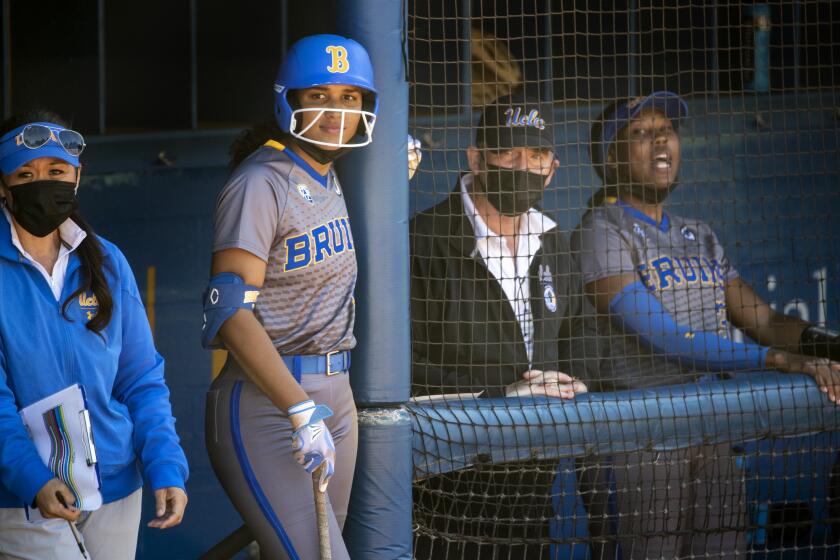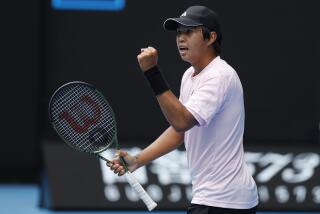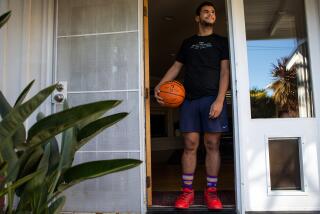UCLA tennis standout Abbey Forbes draws strength from her brother’s adversity
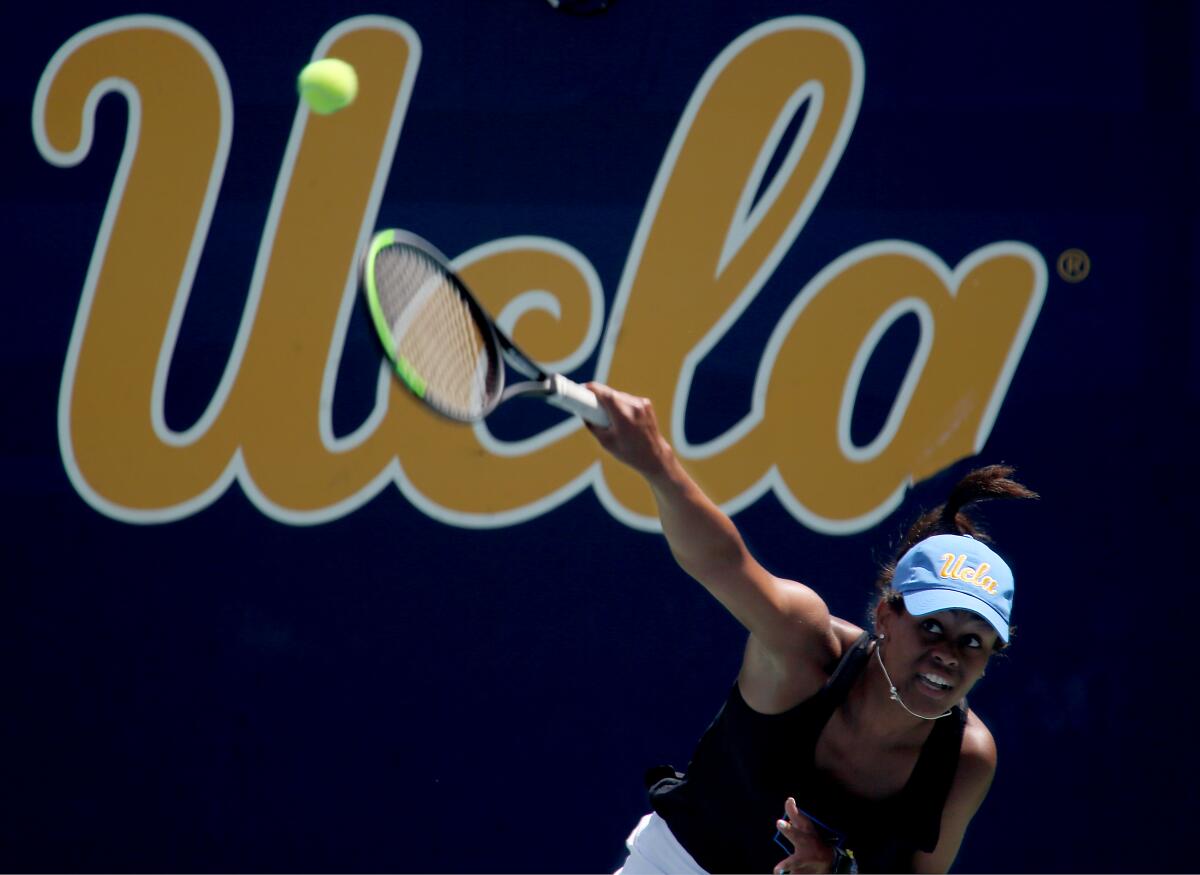
Every day before practice at the Los Angeles Tennis Center, Abbey Forbes calls her mother in North Carolina. The UCLA sophomore wants to say good morning to her brother.
Luke, 16, doesn’t often say much back. His speech is limited by autism. But on one May morning, Luke said even less than normal. He was in the hospital.
Luke had a fever of over 100 degrees and swelling behind an eye that made it look like he was punched. He was suffering from an infection that became an emergency because Luke’s immune system is decimated by chemotherapy treatments.
Abbey, with the blessing of UCLA coach Stella Sampras Webster, kept her phone nearby for updates.
Two years after Luke was diagnosed with B-cell acute lymphoblastic leukemia, Abbey is battling on the court with her brother in mind. UCLA’s top singles player seeded No. 7 nationally advanced to the quarterfinals of the NCAA singles tournament being played this week at the USTA National Campus in Orlando, Fla. Abbey lost to the defending national champion Wednesday, but she remains a core member of the Bruins’ formidable program.
The prospect of playing two weeks of grueling team tennis then jumping into a singles national title tournament may seem daunting, but for Abbey, it’s a challenge that pales in comparison to the fight Luke faces. Her brother, who has lived with autism since he was 2, has more than a year left of his 3½-year cancer treatment.
Learning Luke was in the hospital sent her into a panic before practice. More than 2,500 miles away from Luke’s hospital bed, UCLA was preparing for the toughest stretch of its conference season with matches against Stanford and California coming up that weekend.
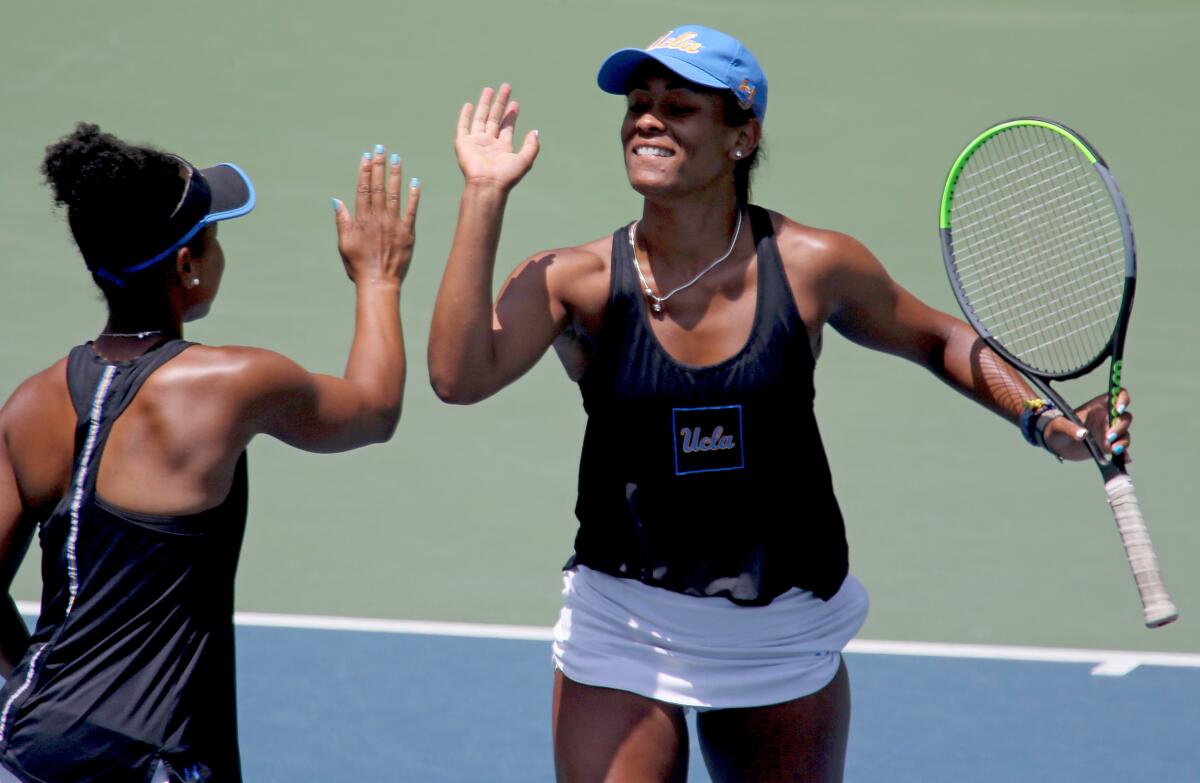
Since Luke was diagnosed with cancer in 2019, Abbey learned to think about nothing but the fuzzy green ball when she stood between the white lines. The Bruins defeated the Cardinal 7-0, the first sweep for UCLA over Stanford when all matches were completed since at least 1986. UCLA then blanked Cal to clinch UCLA’s first outright regular-season conference title in school history. Abbey won both of her singles matches in straight sets, dropping eight combined games.
She smiled again only when she heard Luke was released from the hospital days later.
::
Three years older than Luke, Abbey realized early on that her brother’s life was going to be different than hers. Their parents hung signs up around the house. Therapists came and worked with Luke. He generally kept to himself.
Luke was diagnosed with autism before his second birthday after his mother, Denise Lawson-Forbes, noticed he hadn’t started talking and only responded to his name some of the time. Denise was at home with her son Matthew, who is 18 months younger than Luke.
Now, Luke leans toward the moderate level of the autism spectrum. He can speak in simple sentences. Before he was diagnosed with cancer, he loved to play baseball and soccer. He works through his day with very specific routines from morning to night.
Abbey quickly learned his habits, helping her working parents look after her younger brothers even though she was balancing her own burgeoning tennis career. She is a “mother hen,” Denise said.
The group aims to make UCLA a safe space for Black athletes, where they can discuss and learn from their experiences, then turn them into action.
Luke is sensitive to sounds, so Abbey kept the family’s house in Raleigh, N.C., quiet. She helped him through his nightly routine that had to be executed down to the minute. When others would stare at Luke in public, Abbey held his hand.
Abbey can’t hold his hand now. She still feels his strength from the other side of the country.
“He’s battling two things at once: people who don’t understand his world and a disease that’s trying to kill him,” Abbey said. “He battles it all, and it’s admirable just seeing him cope with everything and still putting a smile on his face.”
::
Abbey had seemingly everything working for her in May 2019. The elite tennis prospect had signed with UCLA. She was slated to play in Grand Slam tournaments that summer. She was getting ready for her senior prom.
Luke’s leukemia diagnosis cast a dark cloud across everything.
“My first instinct was to think, why such an innocent kid, why did he deserve to get this terminal illness?” Abbey said.
Treatment has been arduous for Luke. He lost 70 pounds after his first round of chemotherapy. Abbey couldn’t recognize him. His treatment will continue until 2022, then doctors will monitor him for at least five more years before giving him the all-clear. Luke’s age puts him at higher risk than other kids and he is also allergic to one of the medicines usually used to treat ALL.
Luke’s disability complicates treatment even more. Nurses struggled with simple things like drawing blood, which could trigger an episode because of Luke’s fear of needles. Keeping his routines intact is almost impossible. Doctors and nurses made picture books to help Luke better understand how he will transition between exams.
In the months after hearing of Luke’s diagnosis, Abbey cried a lot. Behind the scenes at tournaments, she broke down thinking about her brother, who is the person with whom she is closest. When she got onto the court, though, it faded away.
“The tennis court was my escape,” she said.
Two months after Luke’s diagnosis, Abbey won Wimbledon, pairing with Pepperdine signee Savannah Broadus for the girls doubles championship. She returned with a glittering silver trophy.
Luke doesn’t understand the prestige of Wimbledon and the other tennis grand slams, but he saw the trophy and knew it meant something good. He told Abbey congrats.
“Her brother would want her to go where she could go and do her best and get an opportunity to play for a great organization. She was meant to be there.”
— Denise Lawson-Forbes
“Even the small things, dinners where he’s happy and smiling, that’s a celebration in and of itself to me,” she said.
When Luke began his treatment, Abbey considered whether to stay closer to home for school. North Carolina, North Carolina State, Duke and Wake Forest all have elite tennis programs. This was a life or death matter in her family, she reasoned.
It was, her mother said, but Luke’s life wasn’t the only one to consider. Go to UCLA, Denise told her daughter. Go change the world.
“Her brother would want her to go where she could go and do her best and get an opportunity to play for a great organization,” Denise said. “She was meant to be there.”
Luke visits the hospital monthly for checkups, getting treatment at the University of North Carolina. The Tar Heels are the No. 1-ranked women’s tennis team in the country. Whenever he enters the hospital, Luke wears a UCLA hat.
::
Several years ago, Rance Brown, who has been an assistant at UCLA for 24 years, got a call from another coach. I got a girl, Brown remembers Butch Young saying. She strikes the ball pretty well.
That turned out to be an understatement.
The moment Brown and Sampras Webster watched Abbey in person, they knew she could play for UCLA. The 5-foot-9 prospect packed raw power in her shots and had toughness they couldn’t teach. They offered her a scholarship on the spot.
As a freshman, Abbey earned All-American status with an 11-1 record in dual matches and 23-3 overall. The Bruins, ranked as high as No. 2, were having their best season since winning the NCAA title in 2014 until it was derailed by the COVID-19 pandemic.
UCLA softball star Maya Brady is proud to be Tom Brady’s niece and inherited her family’s fierce competitive edge, which is helping her make a name for herself with the Bruins.
Instead of finishing her freshman season, Abbey went home. Luke, who thought Abbey wouldn’t be back until June, was perplexed by the entire pandemic.
Luke noticed Matthew stopped going to school. Everyone was wearing the same masks that he had worn since 2019. Denise wondered whether Luke thought everyone had gotten sick like him.
Luke’s personal quarantine began almost a year before the world followed. Unable to go outside or socialize because of his compromised immune system, Luke is almost afraid of his own shadow at this point, Denise joked. “If a butterfly flies by, he’s yelling and ducking.”
But he was an active child before getting diagnosed with cancer. In an effort to get him outside again, Denise worked with Make-A-Wish to get a multi-sport court built in the family’s yard. There’s room for basketball, short-court tennis, pickle ball and badminton.
For the first time in two years, Luke gets to feel like a normal kid, Abbey said. Seeing her brother’s continued progress reminds her of the blessings she receives at UCLA.
“Through all of the scares and through all of the rough treatments, it’s made me realize that though this year hasn’t looked characteristically how I may have wanted it to, I’m very grateful I’m here,” she said. “I’m healthy and my brother is still here, and we’re playing a season.”
Gratitude has been Abbey’s driving force this season. Seeing Luke’s battle inspired her to fight even harder on the court.
After the team practices, it’s common to see Abbey back on the court on her own, sophomore Sasha Vagramov said. Understanding that the individual NCAA tournament follows the team event, Forbes bought a treadmill for the apartment she shares with teammate Elysia Bolton to prepare for the month-long championship season.
It’s that kind of tenacity that makes Brown confident Forbes could become just the second UCLA woman to win an NCAA singles title.
“You can teach Xs and O’s, but that [competitiveness], I feel like she’s the best in the country at it,” Brown said. “I really feel Abbey is the grittiest tennis player out there.”
That kind of drive is rare for a young player, Brown said. He more often sees it from international athletes who have more worldly views. She is just 20, but Abbey is “wise beyond her years,” Denise said. Growing up with a special needs sibling requires that growth.
Through Luke, Abbey learned about the autism community and is now majoring in political science with a disability studies minor. Perhaps tennis will take her to the professional tour. Maybe she will take the LSATs after school. Before that, though, she has an unchecked box.
“My primary goal is to win a national championship,” she said, “win as many as I can for the Bruins, for Stella, for the entire program.”
And for Luke. He may not understand the depth of what his sister could accomplish with an NCAA title — ending an almost two-decade singles drought at UCLA or a six-year dry spell for the team — but he will see the trophy. He knows trophies mean something good.
More to Read
Go beyond the scoreboard
Get the latest on L.A.'s teams in the daily Sports Report newsletter.
You may occasionally receive promotional content from the Los Angeles Times.

